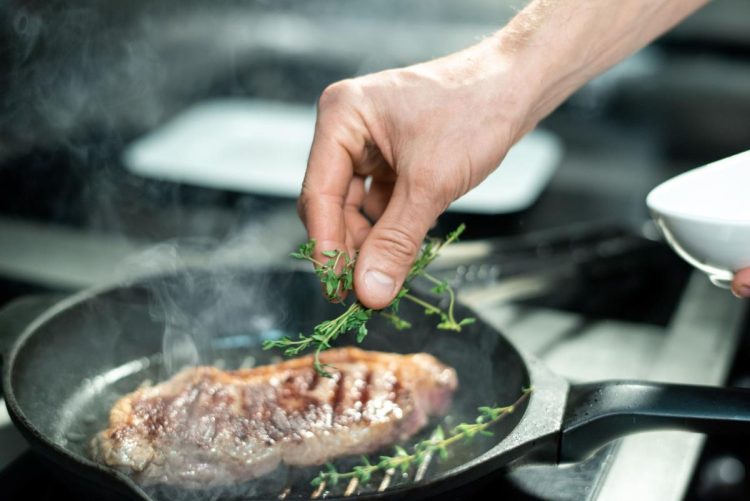Celebrity Chef Bans Vegans: A Controversial Culinary Stand

omnivorous and vegan communities. Among the voices contributing to this discourse, celebrity chefs have emerged as both influencers and provocateurs, sometimes drawing lines in the sand that create rifts in the food community. One such controversial stance came from renowned celebrity chef [Name], who recently announced a ban on vegans from his establishments. This bold declaration sent shockwaves through the culinary world, igniting debates about food ethics, dietary choices, and the role of chefs in shaping culinary culture.
The Chef Behind the Ban
[Name], a celebrated figure in the culinary scene known for [his/her] innovative dishes and flamboyant personality, has long been a proponent of using high-quality, locally sourced ingredients in [his/her] cooking. [He/She] has built an empire around [his/her] culinary philosophy, which emphasizes the importance of traditional cooking methods and the celebration of meat in the culinary arts. As a chef who gained fame through [his/her] television shows, cookbooks, and successful restaurants, [Name] has cultivated a passionate following among food enthusiasts.
However, the announcement to ban vegans from [his/her] restaurants came as a surprise to many. During a press conference held to promote [his/her] latest culinary venture, [Name] expressed frustration over what [he/she] described as a “vegan takeover” of the food industry. [He/She] criticized the movement for overshadowing traditional cooking and the artistry involved in creating meat-based dishes. This controversial stance quickly became a hot topic, stirring passionate reactions from both supporters and detractors.
The Rationale Behind the Ban
Artistic Integrity
At the core of [Name]’s argument is a belief in artistic integrity. For [him/her], cooking is an art form, and like any artist, [he/she] feels that [his/her] creative expression should not be compromised by dietary preferences that fundamentally oppose the philosophy behind [his/her] cuisine. In [his/her] view, a meal is more than just sustenance; it’s a celebration of culture, tradition, and the ingredients themselves.
[Name] articulated that the culinary experience [he/she] offers is designed for those who appreciate the complexity and richness of flavors derived from meat and animal products. In banning vegans, [he/she] aims to preserve the integrity of [his/her] culinary vision, asserting that it is challenging to create an authentic dining experience when a significant portion of the menu must be altered to accommodate dietary restrictions.
Health and Nutrition
Another facet of [Name]’s argument centers around health and nutrition. [He/She] has often emphasized the nutritional benefits of a well-rounded diet that includes animal products. In interviews, [he/she] pointed to studies suggesting that certain nutrients, such as vitamin B12, iron, and omega-3 fatty acids, are more readily available in animal-based foods. While the nutritional debate is nuanced and multifaceted, [Name] believes that a diet devoid of animal products can lead to deficiencies that may compromise overall health.
This assertion resonates with a portion of the public that views veganism as an extreme dietary choice, one that may not be suitable for everyone. By prohibiting vegans, [Name] positions [himself/herself] as a defender of traditional eating habits, championing a diet that includes a variety of food sources.
Cultural Heritage
Culinary traditions are often deeply rooted in cultural heritage, and for [Name], meat plays a pivotal role in many of these traditions. From family recipes passed down through generations to regional specialties that celebrate local livestock, [he/she] believes that veganism threatens to erase these rich culinary histories. The ban on vegans can thus be seen as an attempt to protect and preserve culinary heritage, advocating for the appreciation of time-honored cooking practices.
Public Reaction
The response to [Name]’s announcement was swift and polarized. Social media exploded with reactions, ranging from outrage to support. Many of [his/her] loyal fans praised [him/her] for standing up for traditional cooking and for promoting a balanced approach to nutrition. They appreciated the chef’s candidness and willingness to confront what they saw as an aggressive vegan agenda.
Conversely, the vegan community and many health-conscious individuals expressed indignation. They argued that [Name]’s ban was discriminatory and exclusionary, reinforcing harmful stereotypes about veganism. Critics pointed out that banning vegans from a restaurant does not foster healthy dialogue about dietary choices; rather, it alienates a growing segment of the population that seeks to make ethical and health-conscious decisions.
The Role of Social Media
Social media played a significant role in amplifying the debate. Hashtags such as #BanTheBan and #VegansUnite trended on platforms like Twitter and Instagram, as users shared their opinions and experiences related to veganism and culinary exclusion. Memes and satirical content mocking [Name]’s stance proliferated, further polarizing opinions.
The heated discourse also attracted the attention of food influencers, bloggers, and nutritionists, many of whom weighed in with their perspectives. Some echoed [Name]’s sentiments, advocating for a return to traditional culinary practices, while others defended the rights of vegans to enjoy dining out without facing discrimination.
A Broader Discussion on Dietary Choices
The controversy surrounding [Name]’s ban on vegans opens the door to a broader discussion about dietary choices and their implications on the culinary landscape. Food has always been a reflection of culture, identity, and values, and as such, it can become a battleground for differing philosophies about health, ethics, and sustainability.
The Rise of Veganism
In recent years, veganism has surged in popularity, driven by growing awareness of animal welfare issues, environmental concerns, and health benefits associated with plant-based diets. Major food companies and restaurants have embraced this trend, incorporating vegan options into their menus to cater to the demands of an increasingly conscious consumer base.
This shift has sparked tensions within the culinary community, as traditional chefs grapple with the need to adapt while maintaining their culinary identities. The clash between traditional cooking and modern dietary trends raises questions about the future of cuisine and whether it is possible to create an inclusive dining experience that respects both perspectives.
Navigating Inclusivity
As the culinary landscape evolves, inclusivity becomes an essential consideration for chefs and restaurateurs. While some chefs, like [Name], may feel that compromising their culinary vision is unwarranted, others argue that adapting to accommodate different dietary preferences is crucial in today’s diverse food environment.
Innovative chefs have found ways to celebrate both omnivorous and vegan cuisines, creating menus that offer something for everyone without diluting their artistic integrity. By experimenting with flavors, textures, and techniques, these chefs challenge the notion that dietary restrictions must come at the expense of creativity and quality.
The Future of Culinary Discourse
As the culinary world continues to navigate the complexities of dietary preferences and ethical considerations, discussions like the one sparked by [Name]’s ban will remain relevant. The chef’s bold declaration may have created a divide, but it also highlights the importance of dialogue and understanding in an increasingly polarized food culture.
Fostering Dialogue
To move forward, it is essential for chefs, diners, and the food community at large to engage in open discussions about food choices. Rather than vilifying one another, embracing the diversity of dietary preferences can lead to richer culinary experiences. Chefs can strive to educate their patrons about the philosophy behind their menus while also being receptive to feedback from those with different dietary needs.
The Role of Education
Education is a powerful tool in bridging the gap between differing dietary philosophies. By fostering an understanding of the nutritional, ethical, and cultural implications of food choices, chefs can help their audiences appreciate the nuances of both vegan and omnivorous diets. Culinary schools and cooking classes can also play a role in promoting inclusivity, teaching aspiring chefs how to create dishes that cater to various dietary preferences without sacrificing quality.
Conclusion
The ban on vegans by celebrity chef [Name] serves as a provocative catalyst for discussions about dietary choices, culinary heritage, and the role of chefs in shaping food culture. While [his/her] stance may have drawn criticism and support in equal measure, it has undeniably ignited a conversation that is essential in today’s food landscape.





